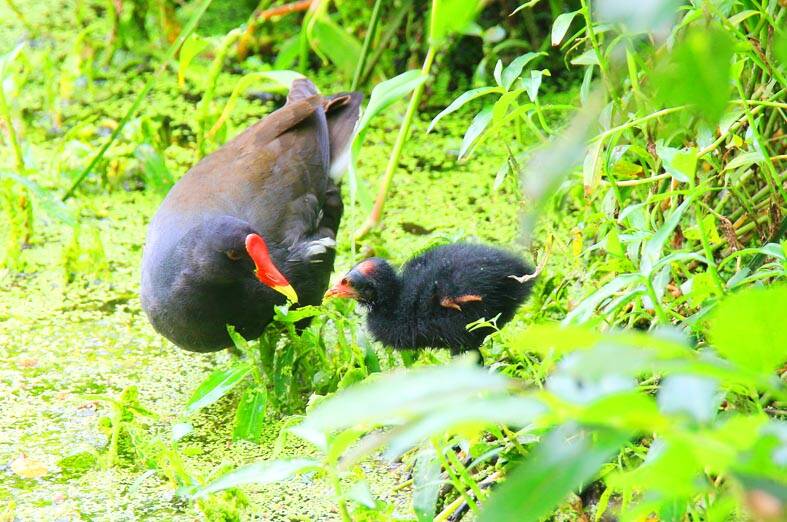The Taiwan Wild Bird Federation and the Taiwan Biodiversity Research Institute yesterday invited bird-watchers from across the nation to help complete the Taiwan Bird Atlas by 2028 after the project was officially launched in January.
The project is a collaboration between the two bodies and Ithaca, New York-based Cornell Lab of Ornithology, the federation said in a statement.
Similar initiatives have been launched in 93 countries, involving more than 600 projects and the participation of at least 380,000 people as of 2021, the statement said.

Photo courtesy of Taiwan Wild Bird Federation
Bird atlases are crucial for documenting and conserving biodiversity, it said.
“The goal is to complete detailed maps outlining the distribution, breeding and number of bird species across Taiwan by 2028,” it said.
Prior to the official launch of the atlas project this year, the federation and the institute jointly launched the eBird Taiwan portal — modeled after and hosted on an online platform developed by the Cornell laboratory and the New York-based National Audubon Society — in 2015, the statement said.
It has since become Taiwan’s largest open source of biodiversity data, with more than 12 million records as of last year, it said.
“Additionally, the institute has developed SILIC [Sound Identification and Labeling Intelligence for Creatures], an artificial-intelligence tool that identifies birds based on the sounds they make,” it said. “The atlas project will build on these foundations.”
Federation secretary-general Lu Yi-wei (呂翊維) said that people who want to participate in the project can visit the online Taiwan Bird Atlas portal at https://ebird.org/atlastw or join the eBird Taiwan group on Facebook.
Participants are expected to conduct observations in units of 5km2, Lu said, adding that they must accumulate at least 20 hours of observations in each grid within five years.
“They should try their best to visit major habitats and use the eBird database to record as much about the species and quantities of birds they see,” he said.
“Unlike general bird-watching activities, users must go one step further to observe and record the breeding behaviors of birds, such as pair activity, nest building, or carrying food to raise chicks,” he added.
The Bird Atlas is crucial for recording and conserving biodiversity and requires a considerable amount of data, Lu said, adding that engaging the public in data collection is the best way to obtain a lot of information and accurately map the distribution of bird species.

TRUST: The KMT said it respected the US’ timing and considerations, and hoped it would continue to honor its commitments to helping Taiwan bolster its defenses and deterrence US President Donald Trump is delaying a multibillion-dollar arms sale to Taiwan to ensure his visit to Beijing is successful, a New York Times report said. The weapons sales package has stalled in the US Department of State, the report said, citing US officials it did not identify. The White House has told agencies not to push forward ahead of Trump’s meeting with Chinese President Xi Jinping (習近平), it said. The two last month held a phone call to discuss trade and geopolitical flashpoints ahead of the summit. Xi raised the Taiwan issue and urged the US to handle arms sales to

A magnitude 5.6 earthquake struck off the coast of Yilan County at 12:37pm today, with clear shaking felt across much of northern Taiwan. There were no immediate reports of damage. The epicenter of the quake was 16.9km east-southeast of Yilan County Hall offshore at a depth of 66.8km, Central Weather Administration (CWA) data showed. The maximum intensity registered at a 4 in Yilan County’s Nanao Township (南澳) on Taiwan’s seven-tier scale. Other parts of Yilan, as well as certain areas of Hualien County, Taipei, New Taipei City, Taoyuan, Hsinchu County, Taichung and Miaoli County, recorded intensities of 3. Residents of Yilan County and Taipei received

Taiwan has secured another breakthrough in fruit exports, with jujubes, dragon fruit and lychees approved for shipment to the EU, the Ministry of Agriculture said yesterday. The Animal and Plant Health Inspection Agency on Thursday received formal notification of the approval from the EU, the ministry said, adding that the decision was expected to expand Taiwanese fruit producers’ access to high-end European markets. Taiwan exported 126 tonnes of lychees last year, valued at US$1.48 million, with Japan accounting for 102 tonnes. Other export destinations included New Zealand, Hong Kong, the US and Australia, ministry data showed. Jujube exports totaled 103 tonnes, valued at

BIG SPENDERS: Foreign investors bought the most Taiwan equities since 2005, signaling confidence that an AI boom would continue to benefit chipmakers Taiwan Semiconductor Manufacturing Co’s (TSMC, 台積電) market capitalization swelled to US$2 trillion for the first time following a 4.25 percent rally in its American depositary receipts (ADR) overnight, putting the world’s biggest contract chipmaker sixth on the list of the world’s biggest companies by market capitalization, just behind Amazon.com Inc. The site CompaniesMarketcap.com ranked TSMC ahead of Saudi Aramco and Meta Platforms Inc. The Taiwanese company’s ADRs on Tuesday surged to US$385.75 on the New York Stock Exchange, as strong demand for artificial intelligence (AI) applications led to chip supply constraints and boost revenue growth to record-breaking levels. Each TSMC ADR represents